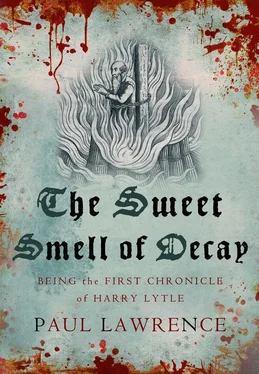Paul Lawrence - The Sweet Smell of Decay
Здесь есть возможность читать онлайн «Paul Lawrence - The Sweet Smell of Decay» весь текст электронной книги совершенно бесплатно (целиком полную версию без сокращений). В некоторых случаях можно слушать аудио, скачать через торрент в формате fb2 и присутствует краткое содержание. Год выпуска: 2014, ISBN: 2014, Издательство: Allison & Busby, Жанр: Исторический детектив, на английском языке. Описание произведения, (предисловие) а так же отзывы посетителей доступны на портале библиотеки ЛибКат.
- Название:The Sweet Smell of Decay
- Автор:
- Издательство:Allison & Busby
- Жанр:
- Год:2014
- ISBN:9780749015473
- Рейтинг книги:5 / 5. Голосов: 1
-
Избранное:Добавить в избранное
- Отзывы:
-
Ваша оценка:
- 100
- 1
- 2
- 3
- 4
- 5
The Sweet Smell of Decay: краткое содержание, описание и аннотация
Предлагаем к чтению аннотацию, описание, краткое содержание или предисловие (зависит от того, что написал сам автор книги «The Sweet Smell of Decay»). Если вы не нашли необходимую информацию о книге — напишите в комментариях, мы постараемся отыскать её.
The Sweet Smell of Decay — читать онлайн бесплатно полную книгу (весь текст) целиком
Ниже представлен текст книги, разбитый по страницам. Система сохранения места последней прочитанной страницы, позволяет с удобством читать онлайн бесплатно книгу «The Sweet Smell of Decay», без необходимости каждый раз заново искать на чём Вы остановились. Поставьте закладку, и сможете в любой момент перейти на страницу, на которой закончили чтение.
Интервал:
Закладка:
‘Confession to what crime?’
‘Confession that he had killed both Anne Ormonde and John Giles.’
‘Ah yes!’ the Attorney General proclaimed, ensuring that the jury did not become confused, ‘because he was at odds with John Giles over some affair at the Exchange.’
‘Indeed,’ Hill continued, ‘and so I followed him into Alsatia that I might find where he had Hewitt kept, and seek to persuade him to liberate him.’
‘Very noble of you,’ the Attorney General remarked reverentially. The first time in my life I had heard anyone refer to Hill as noble. Him too, I supposed, judging by the pink patches that appeared on his cheeks. Godamercy — he was blushing! With shame, I hoped.
‘Aye well, not so noble I suppose.’
‘What happened?’
‘I followed him deep into the tenements there. He went to a house that was derelict.’
Now what was happening? I suddenly realised that he had made no reference to Davy Dowling in any of this. And he was deliberately omitting Thomas and Mary besides, two acquaintances of Dowling’s. I didn’t mind him leaving Dowling out of this tale, indeed it was a blessing, but I wondered what was his motive? By leaving Dowling out of his account he effectively isolated me in the telling of it, but I was not permitted to call witnesses. By leaving Dowling out of it he lost a chance to condemn the butcher alongside me, leaving him free to tell what tales he may. Why would he do that? Why would Shrewsbury wish it so? Unless Dowling had betrayed me too? That was difficult to credit. Yet I felt momentarily shocked and my already downtrodden soul lost another drop of spirit.
‘Derelict, you say?’
‘Aye, not habitable. There were some animals there that I suppose were kept by folks that lived close by. Also there was a cellar, and it was there that the accused had imprisoned Hewitt.’
‘You saw it?’
‘I saw the accused go into this ruin. He had a key with him that he used to unlock a chain that lay on the floor. He then pulled the cellar door up open, which was when I realised what it was. He descended down some steps and then came up with Hewitt who was bound in ropes and in a very sorry state.’
‘A very sorry state?’
‘Aye, I reckon he had been down there for at least two days.’ Aye — and so he had. Hill described the scene too well.
‘Then what happened?’
‘Well, the accused asked him questions about the murders. He was seeking for Matthew Hewitt to confess to the crimes. When Hewitt did not, then the accused became enraged. He kicked Hewitt while he was on the floor, still bound with the ropes. Eventually he kicked him so hard that he started to bleed from the mouth.’
‘Did the accused then administer aid?’
‘No, sir. I fancy that he lost his senses at that point and kicked Hewitt all the harder.’
‘What a brute,’ whispered the Attorney General. Now I had all the jurors staring at me again and the judge besides. What nonsense. I sat dejected waiting for Hill to resume his silly tale.
‘Aye, well once he had seemingly killed Hewitt he took a knife from his pocket and cut the man’s tongue out.’ I gasped myself at this atrocity — the atrocity that Hill should lay the ownership of that barbaric act at my door. The rest of the court started shouting curses at me because they believed it. It took the clerks some minutes to restore order while I sat there embarrassed and fuming. Hill looked at me again, this time openly and boldly. So — he had finally sold his soul and cared not who knew it.
Puffing up his chest and straightening his jacket he declared in loud voice, ‘Then he nailed it onto the trapdoor and walked out in a tremendous fury!’
I wondered from where I had got hammer and nail in this derelict hovel, but did not of course have the opportunity to ask. It was several minutes before the clerks could persuade the assembled throng to at least stop shouting and wailing. The judge sat impassive throughout, eyes fixed on my miserable self. When he cleared his throat all were quiet. ‘Doth the accused understand the testimony that hath been spake thus far?’ He leant forward and eyed me like his lunch.
‘I understand it,’ I replied, attempting to establish that did not mean that I agreed it was true without incurring the judge’s wrath.
‘Very well. Proceed!’
‘Mr Hill,’ the Attorney General said in a whisper, so that all had to hush in order to hear him speak, ‘what did the accused do next? Was this not enough?’
‘No, sir. For he then went to Epsom.’
‘Why did he do that?’
A better question would have been — when did he do that? Hill had the timings all wrong.
‘I think it was because I advised him, if you will recall.’
‘Ah yes! You had suggested to him earlier that he go to Epsom to make peace with the family of Anne Ormonde.’
‘Aye, sir, well now he did go. I don’t know why he decided to go at this particular time, but I think it may have been to deliver his account of the death of Anne Ormonde and the motives behind it.’
‘I see. That is logical.’
Very logical now that the order of events had been so neatly amended.
‘Aye, well, whatever the reason he went, he was not permitted audience. Neither William Ormonde nor any of his family was willing to speak to him. He was not of their family, of course, and they were in mourning.’
‘Understandable. So he came home again.’
‘No, sir.’
‘No?’
‘No. He went to see a woman called Elizabeth Johnson.’
‘Who is Elizabeth Johnson?’
‘She is an old woman who used to be nanny to Anne Ormonde, and Jane Keeling besides.’
‘Jane Keeling is the daughter of Lord Keeling?’
‘Aye sir, she was. She died of a fever ten years ago.’
‘I see. And why did the accused go to see Elizabeth Johnson?’
‘I don’t know what led him to her house, but once he made acquaintance then I fear that he allowed himself to be led astray once more.’ Hill paused, confident now. The Attorney General saw it, and let him have his moment. ‘She is a very old woman and is known at Epsom for being weak in the head. The accused would not know this, since he does not come from Epsom.’
‘Naturally.’
‘Aye, naturally. Well, she told the accused a tall tale that Jane Keeling took her own life because she was with child, and that the child was fathered by William Ormonde.’
‘How so?’ The Attorney General cut short the hysteria that threatened to engulf the court once more, his whole body proclaiming the absurdity of the idea.
‘Aye, sir — an absurd notion, but the woman is very old and, it is said, is prone to fabricating such stories. Those that know her humour her in this, because she is old and has given many years of service to some great families at Epsom.’
‘Indeed.’ The Attorney General bowed his head. At least they weren’t going to accuse her of being a witch.
‘Aye, well at this the accused became convinced that he had been misled. He became sure that it was Keeling himself that had killed Anne Ormonde, and John Giles besides, as revenge upon William Ormonde.’
‘Ludicrous.’ The Attorney General shook his head doubtfully. ‘That an old woman might peddle strange tales is one thing, that the accused should credit such tales is another. Are you sure it was so?’
‘Yes, sir. I am sure.’
‘How so?’
‘Well, what he did next was proof of it.’ Hill looked at me again. Black bottomless pits. Here we go. The coup de grace. Keeling had asked me to puff out my chest that the sword would glide easily through my ribs. I had escaped then, but I saw no way out now. Hill kept his eyes on mine as he told the tale of how I had disinterred the body of Jane Keeling. The court exploded in a frenzy of collective rage. There were only two souls that stayed calm while the storm raged above our heads — the only two that knew the truth of it — myself and Hill. Hill, my old friend and confidant, stood six paces from me, weaving with his tongue the web that would entrap me, watching me with steady black eyes while he did it. Seemed to me that moment lasted many minutes. It was a reckoning of sorts. Slowly the din subsided and the court was silent again, the audience awaiting the final act.
Читать дальшеИнтервал:
Закладка:
Похожие книги на «The Sweet Smell of Decay»
Представляем Вашему вниманию похожие книги на «The Sweet Smell of Decay» списком для выбора. Мы отобрали схожую по названию и смыслу литературу в надежде предоставить читателям больше вариантов отыскать новые, интересные, ещё непрочитанные произведения.
Обсуждение, отзывы о книге «The Sweet Smell of Decay» и просто собственные мнения читателей. Оставьте ваши комментарии, напишите, что Вы думаете о произведении, его смысле или главных героях. Укажите что конкретно понравилось, а что нет, и почему Вы так считаете.












